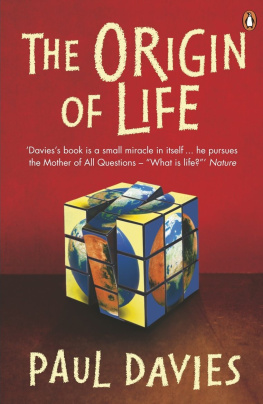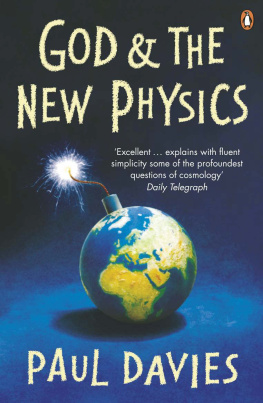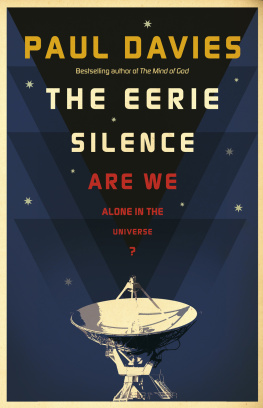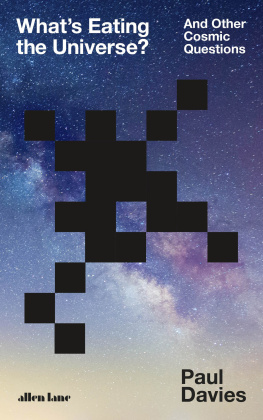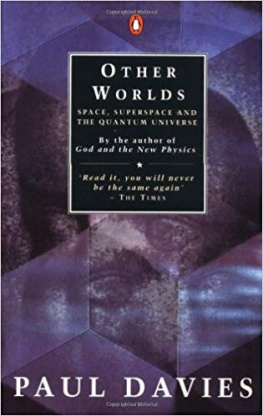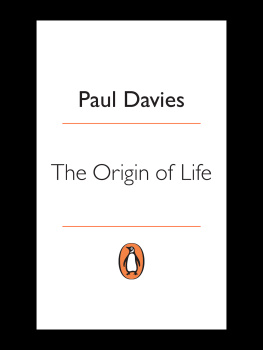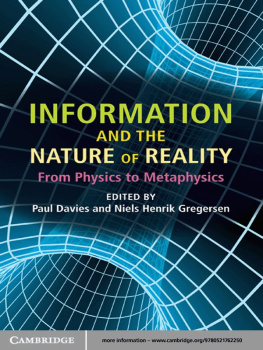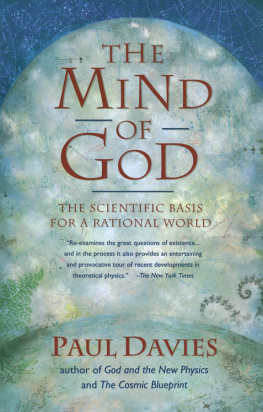Paul Davies - The Mind of God (Popular Penguins)
Here you can read online Paul Davies - The Mind of God (Popular Penguins) full text of the book (entire story) in english for free. Download pdf and epub, get meaning, cover and reviews about this ebook. year: 0, genre: Science. Description of the work, (preface) as well as reviews are available. Best literature library LitArk.com created for fans of good reading and offers a wide selection of genres:
Romance novel
Science fiction
Adventure
Detective
Science
History
Home and family
Prose
Art
Politics
Computer
Non-fiction
Religion
Business
Children
Humor
Choose a favorite category and find really read worthwhile books. Enjoy immersion in the world of imagination, feel the emotions of the characters or learn something new for yourself, make an fascinating discovery.
- Book:The Mind of God (Popular Penguins)
- Author:
- Genre:
- Year:0
- Rating:4 / 5
- Favourites:Add to favourites
- Your mark:
- 80
- 1
- 2
- 3
- 4
- 5
The Mind of God (Popular Penguins): summary, description and annotation
We offer to read an annotation, description, summary or preface (depends on what the author of the book "The Mind of God (Popular Penguins)" wrote himself). If you haven't found the necessary information about the book — write in the comments, we will try to find it.
The Mind of God (Popular Penguins) — read online for free the complete book (whole text) full work
Below is the text of the book, divided by pages. System saving the place of the last page read, allows you to conveniently read the book "The Mind of God (Popular Penguins)" online for free, without having to search again every time where you left off. Put a bookmark, and you can go to the page where you finished reading at any time.
Font size:
Interval:
Bookmark:
Paul Davies
The Mind of God
Science and the Search for Ultimate Meaning
|
Penguin Books |
Published by the Penguin Group
Penguin Books Ltd, 27 Wrights Lane, London W8 5TZ, England
Penguin Books USA Inc., 375 Hudson Street, New York, New York 10014, USA
Penguin Books Australia Ltd, Ringwood, Victoria, Australia
Penguin Books Canada Ltd, 10 Alcorn Avenue, Toronto, Ontario, Canada M4V 3B2
Penguin Books (NZ) Ltd, 182190 Wairau Road, Auckland 10, New Zealand
Penguin Books Ltd, Registered Offices: Harmondsworth, Middlesex, England
First published in Great Britain by Simon & Schuster Ltd 1992
[The Mind of God: The Scientific Basis for a Rational World]
Published in Penguin Books 1993
3 5 7 9 10 8 6 4 2
Orion Productions, 1992
For Caroline, in recognition of
your own search for truth
Contents
If we do discover a complete theory, it should in time be understandable in broad principle by everyone, not just a few scientists. Then we shall all, philosophers, scientists, and just ordinary people, be able to take part in the discussion of why it is that we and the universe exist. If we find the answer to that, it would be the ultimate triumph of human reasonfor then we would truly know the mind of God. Stephen Hawking Concluding sentence of A Brief History of Time |
When i was a child I used to infuriate my parents by continually asking why? Why cant I go out to play? Because it might rain. Why might it rain? Because the weatherman has said so. Why has he said so? Because there are storms coming up from France. Why are there... ? And so on. These relentless interrogations normally ended with a desperate Because God made it that way, and that's that! My childhood discovery (deployed more out of boredom than philosophical acuteness) that the explanation of a fact or circumstance itself demanded an explanation, and that this chain might continue indefinitely, has troubled me ever since. Can the chain of explanation really stop somewhere, with God perhaps, or with some superlaw of nature? If so, how does this supreme explanation itself escape the need to be explained? In short, can that ever be that?
When I became a university student I reveled in the ability of science to provide such breathtaking answers to our questions about the world. The power of science to explain things is so dazzling I found it easy to believe that, given the resources, all the secrets of the universe might be revealed. Yet the why, why, why... ? worry returned. What lies at the bottom of this magnificent explanatory scheme? What holds it all up? Is there an ultimate level, and if so where did that come from? Could one be satisfied with a thats-that explanation?
In later years I began doing research on topics like the origin of the universe, the nature of time, and the unification of the laws of physics, and I found myself trespassing on territory that for centuries had been the near-exclusive province of religion. Yet here was science either providing answers to what had been left as dark mysteries, or else discovering that the very concepts from which those mysteries drew their power were actually meaningless or even wrong. My book God and the New Physics was a first effort to grapple with this clash of ideologies. The Mind of God is a more considered attempt.
Since publication of the first book, a lot of new ideas have emerged at the forefront of fundamental physics: the superstring theory and other approaches to so-called Theories of Everything, quantum cosmology as a means of explaining how the universe might appear from nothing, Stephen Hawkings work on imaginary time and the cosmological initial conditions, chaos theory and the concept of self-organizing systems, and advances in the theory of computation and complexity. In addition, there has been an enormous resurgence of interest in what might be crudely described as the science-religion interface. This has taken two distinct forms. First, a greatly increased dialogue between scientists, philosophers, and theologians about the concept of creation and related issues. Second, a growing fashion for mystical thinking and Eastern philosophy, which some commentators have claimed makes deep and meaningful contact with fundamental physics.
I should like to make my own position clear at the outset. As a professional scientist I am fully committed to the scientific method of investigating the world. I believe that science is an immensely powerful procedure for helping us to understand the complex universe in which we live. History has shown that its successes are legion, and scarcely a week passes without some new progress being made. The attraction of the scientific method goes beyond its enormous power and scope, however. There is also its uncompromising honesty. Every new discovery, every theory is required to pass rigorous tests of approval by the scientific community before it is accepted. Of course, in practice, scientists do not always follow the textbook strategies. Sometimes the data are muddled and ambiguous. Sometimes influential scientists sustain dubious theories long after they have been discredited. Occasionally scientists cheat. But these are aberrations. Generally, science leads us in the direction of reliable knowledge.
I have always wanted to believe that science can explain everything, at least in principle. Many nonscientists would deny such a claim resolutely. Most religions demand belief in at least some supernatural events, which are by definition impossible to reconcile with science. I would rather not believe in supernatural events personally. Although I obviously cant prove that they never happen, I see no reason to suppose that they do. My inclination is to assume that the laws of nature are obeyed at all times. But even if one rules out supernatural events, it is still not clear that science could in principle explain everything in the physical universe. There remains that old problem about the end of the explanatory chain. However successful our scientific explanations may be, they always have certain starting assumptions built in. For example, an explanation of some phenomenon in terms of physics presupposes the validity of the laws of physics, which are taken as given. But one can ask where these laws come from in the first place. One could even question the origin of the logic upon which all scientific reasoning is founded. Sooner or later we all have to accept something as given, whether it is God, or logic, or a set of laws, or some other foundation for existence. Thus ultimate questions will always lie beyond the scope of empirical science as it is usually defined. So does this mean that the really deep questions of existence are unanswerable? I notice, on perusing the list of my chapter and section titles, that an awful lot of them are questions. At first I thought this was stylistic ineptitude, but I now realize that it reflects my instinctive belief that it is probably impossible for poor old Homo sapiens to get to the bottom of it all. Probably there must always be some mystery at the end of the universe. But it seems worth pursuing the path of rational inquiry to its limit. Even a proof that the chain of inference is uncompletable would be worth knowing. As we shall see, something of that sort has already been demonstrated in mathematics.
Many practicing scientists are also religious. Following the publication of God and the New Physics, I was astonished to discover how many of my close scientific colleagues practice a conventional religion. In some cases they manage to keep these two aspects of their lives separate, as if science rules six days a week, and religion on Sunday. A few scientists, however, make strenuous and sincere efforts to bring their science and their religion into harmony. Usually this entails taking a very liberal view of religious doctrine on the one hand, and on the other hand imbuing the world of physical phenomena with a significance that many of their fellow scientists find unappealing.
Next pageFont size:
Interval:
Bookmark:
Similar books «The Mind of God (Popular Penguins)»
Look at similar books to The Mind of God (Popular Penguins). We have selected literature similar in name and meaning in the hope of providing readers with more options to find new, interesting, not yet read works.
Discussion, reviews of the book The Mind of God (Popular Penguins) and just readers' own opinions. Leave your comments, write what you think about the work, its meaning or the main characters. Specify what exactly you liked and what you didn't like, and why you think so.


